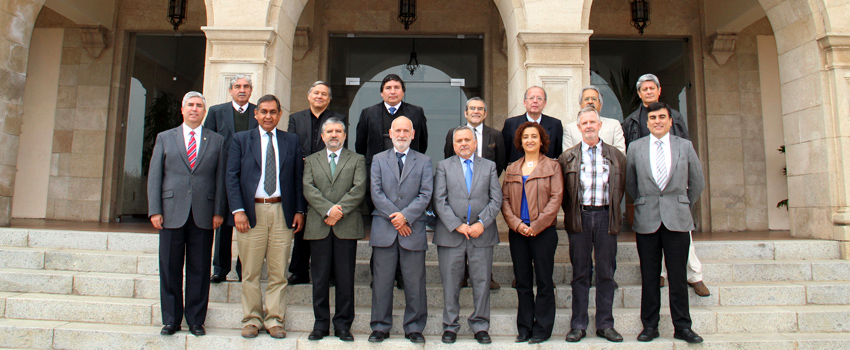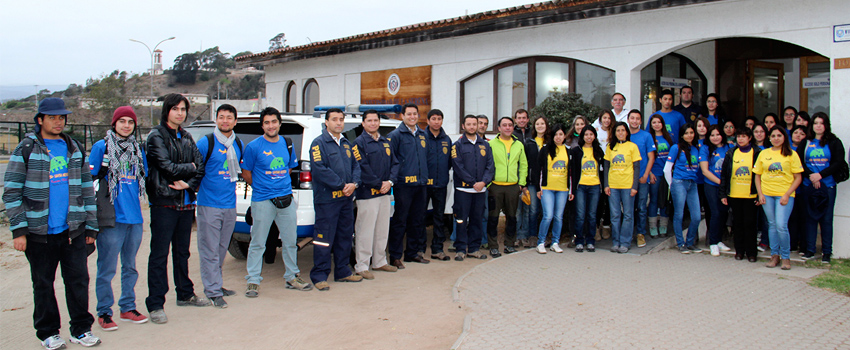
Coinciding with the passage of the aircraft, the validation of the remotely detected data was carried out through a Terrain Group, whose members made measurements and took samples of soil and vegetation in various types of agricultural fields.
For the second consecutive year, the UAVSAR (Uninhabited Aerial Vehicle Synthetic Aperture Radar) mission, a NASA air vehicle that has a polarimetric L-band radar sensor, flew over a large part of the Coquimbo Region with the purpose of making soil moisture measurements. by radar remote sensing. An international cooperation project was incorporated this year to the four fields measured in 2013 (Juan Soldado, Callegari, La Alpina and Las Cardas). and from the University of La Serena, through the head of the Central Laboratory for Analysis and Applied Research of the state campus, Mg. Héctor Maureira, who added to the analysis the vineyards of Tamaya and Tabalí (Province of Limarí) with the objective of creating a Water Management Model for the cultivation of the vine, using satellite data, which will provide a decision-making tool for managing the irrigation, through maps of Evapotranspiration, Temperature and Humidity of Soil and Vegetation, and Water Stress.
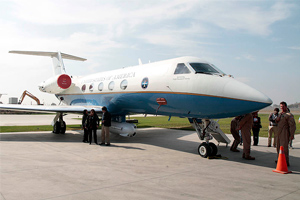 It is expected that through the use of satellite information it will be possible to increase yield and quality related to key parameters such as: yield per hectare, sugar content and bunch density. "All of the above can be achieved through the information generated by maps, which will make it possible to adopt an efficient irrigation strategy, knowing when and how much water to use," said Maureira, who maintained that the model could also be expanded to other crops or natural plant covers of our region, currently exposed to a long period of drought.
It is expected that through the use of satellite information it will be possible to increase yield and quality related to key parameters such as: yield per hectare, sugar content and bunch density. "All of the above can be achieved through the information generated by maps, which will make it possible to adopt an efficient irrigation strategy, knowing when and how much water to use," said Maureira, who maintained that the model could also be expanded to other crops or natural plant covers of our region, currently exposed to a long period of drought.
For the validation of the data remotely detected by the radar, the support of a Field Group made up of more than 70 people was required, which, coinciding with the passage of the aircraft, made measurements and took samples of soil and vegetation in the fields. aforementioned agriculture.
''Soil samples were taken to measure humidity and also samples of biomass, that is, of vegetables. To these is added the measurement of the roughness of the terrain and the temperature, which are elements that serve to correct the radar images,'' explained the ULS researcher, Héctor Maureira, adding that this sampling was in charge of of students and professionals from the University of La Serena, the Catholic University of the North, the Mayor University, the Oterra Natural Resources Study Center and the Santo Tomas Institute and Technical Training Center, after lining up and marking points of the Chilean Army (Regiment No. 21 Coquimbo) and the Chilean Navy (Maritime Government of Coquimbo). While personnel from the Investigative Police of Chile (Metropolitan Region), carried out the georeferencing of the sampling points, "in order to achieve absolute precision of the point in which the sample is taken, which is compared with the information that generates the plane," said the expert.
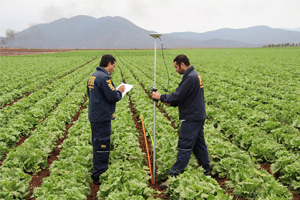 The field work had the collaboration of these institutions and the University of Chile - Ceza Arid Zones Study Center, the Ministry of Public Works, Agrícola Callegari Ltda., Agrícola La Alpina Ltda., Viña Tabalí SA and Viña Tamaya SA In addition, This mission was sponsored by the Compañía Minera del Pacífico.
The field work had the collaboration of these institutions and the University of Chile - Ceza Arid Zones Study Center, the Ministry of Public Works, Agrícola Callegari Ltda., Agrícola La Alpina Ltda., Viña Tabalí SA and Viña Tamaya SA In addition, This mission was sponsored by the Compañía Minera del Pacífico.
According to what was indicated by the person in charge of the NASA-UAVSAR Mission in the Coquimbo Region, Héctor Maureira, it is expected that the results of the samples and the information obtained by the plane will be ready by the end of July.
The NASA-UAVSAR mission constitutes a test of the sensors that is being carried out through various places on Earth to validate those that will be incorporated into the SMAP (Soil Moisture Activ Passiv) satellite that will be launched on November 5, 2014. with which periodic measurements of soil humidity of the entire planet will be obtained, serving as a basic input for the creation of humidity and drought models, which will allow us to understand, together with other data, the climatological processes suffered by the region

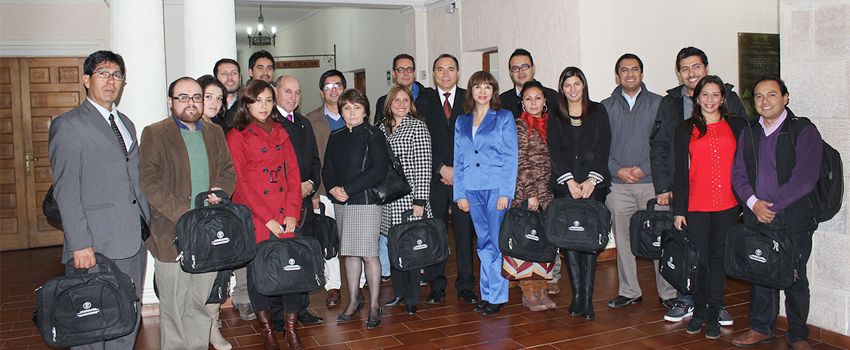
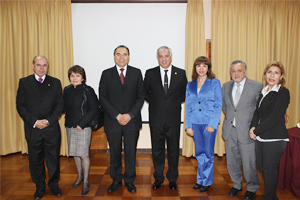 Dr. Rojas added that ''for us this process has been very important, this is the fifth generation of students who have entered and we have important challenges such as the accreditation of the program and the opportunity to teach it in Argentina at the National University of San Juan . We are happy, we have made notable progress with the graduates, which shows us that we are on the right path, given that the people who have entered have been climbing in their professional lives, that is important because it shows that from this Master's degree onwards they They manage to differentiate themselves.
Dr. Rojas added that ''for us this process has been very important, this is the fifth generation of students who have entered and we have important challenges such as the accreditation of the program and the opportunity to teach it in Argentina at the National University of San Juan . We are happy, we have made notable progress with the graduates, which shows us that we are on the right path, given that the people who have entered have been climbing in their professional lives, that is important because it shows that from this Master's degree onwards they They manage to differentiate themselves.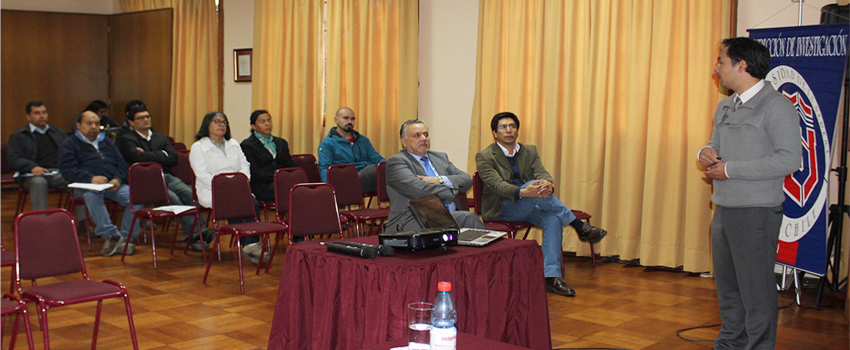
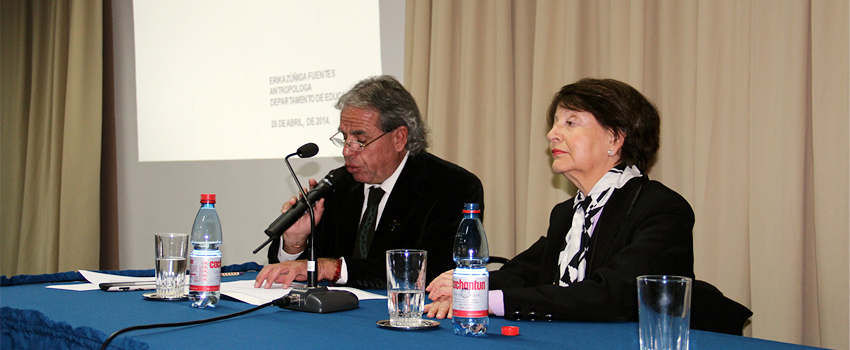
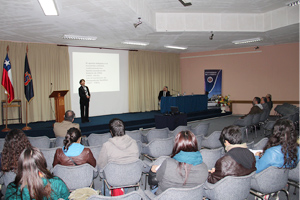 With the purpose of contributing to this task whose main expression is constituted by dozens of theses, scientific articles, research projects, Logos magazine, dozens of prestigious visiting professors, talented candidates, among others, the anthropologist and academic from the Department of Education of the ULS, Dr. Érika Zúñiga, gave the Inaugural Class: ''The Native Peoples in the Educational Stories of the Nation'', thesis work of her Doctorate in which she addressed the indigenous contribution to the colonial economy, confronting the school texts of History of Chile (1845-2012), with the testimony of Hernando de Santillán (1557-1561). As the teacher commented, the study sought to demonstrate the existence in school textbooks of the prejudice that the indigenous people in Chile would not present the conditions to adapt to the colonizing economy, their ''laziness'' appearing strongly associated with this. In the work, the school text was conceived as a cultural tool of the republican State to promote the national ethos, the analysis focused on the economic role of the indigenous as a counterweight to the warlike image of the Conquest and sought to observe the origin, development and persistence of negative stereotypes about indigenous people.
With the purpose of contributing to this task whose main expression is constituted by dozens of theses, scientific articles, research projects, Logos magazine, dozens of prestigious visiting professors, talented candidates, among others, the anthropologist and academic from the Department of Education of the ULS, Dr. Érika Zúñiga, gave the Inaugural Class: ''The Native Peoples in the Educational Stories of the Nation'', thesis work of her Doctorate in which she addressed the indigenous contribution to the colonial economy, confronting the school texts of History of Chile (1845-2012), with the testimony of Hernando de Santillán (1557-1561). As the teacher commented, the study sought to demonstrate the existence in school textbooks of the prejudice that the indigenous people in Chile would not present the conditions to adapt to the colonizing economy, their ''laziness'' appearing strongly associated with this. In the work, the school text was conceived as a cultural tool of the republican State to promote the national ethos, the analysis focused on the economic role of the indigenous as a counterweight to the warlike image of the Conquest and sought to observe the origin, development and persistence of negative stereotypes about indigenous people. 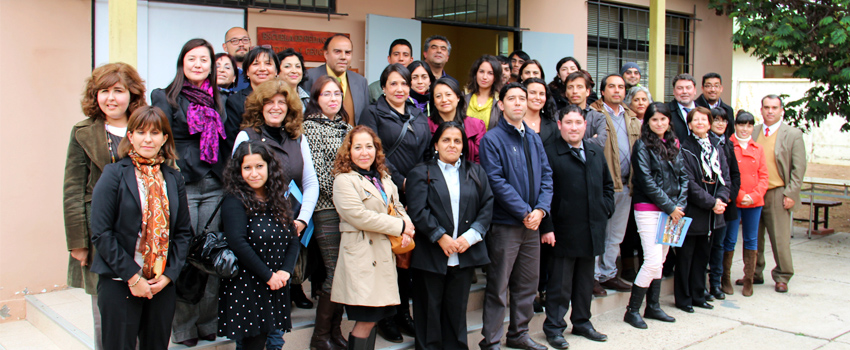
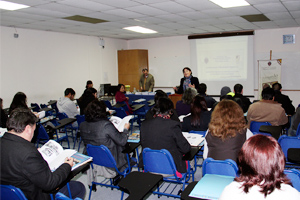 That is why the day included the conferences ''Presence of Indigenous Peoples in History Textbooks'', by Dr. Erika Zúñiga, from the ULS Department of Education, and ''Development of Cognitive Skills and their Classroom Application'' (EDUCREA materials), from Mg. Ximena Cortés, from the Department. of Cs. Social ULS and English Catholic School of La Serena.
That is why the day included the conferences ''Presence of Indigenous Peoples in History Textbooks'', by Dr. Erika Zúñiga, from the ULS Department of Education, and ''Development of Cognitive Skills and their Classroom Application'' (EDUCREA materials), from Mg. Ximena Cortés, from the Department. of Cs. Social ULS and English Catholic School of La Serena.